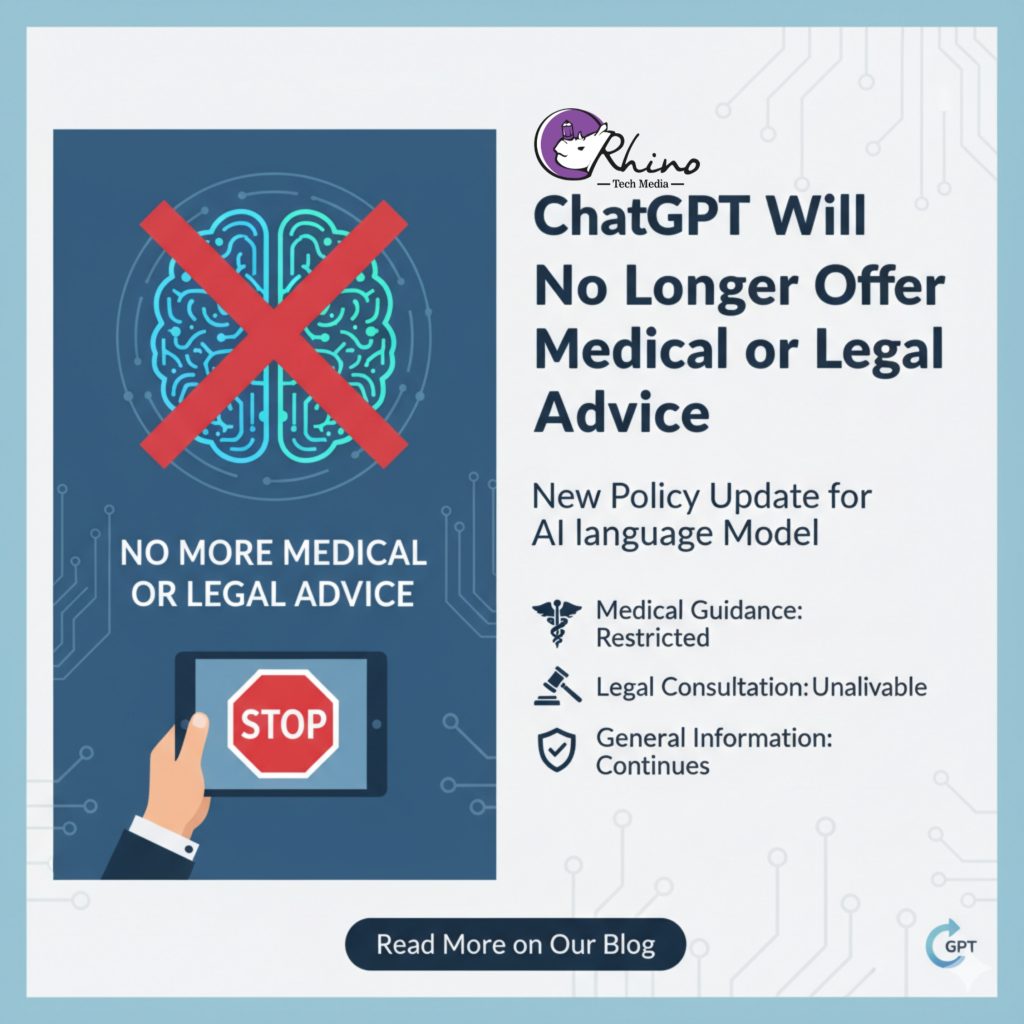Introduction
Artificial-intelligence chatbots have increasingly been used for all kinds of queries — from finding a recipe or summarising a document, to asking for health or legal guidance. However, as of late October 2025, OpenAI updated its Usage Policies so that ChatGPT is explicitly prohibited from providing advice in domains that require professional licensing, such as medical or legal advice. This marks a significant shift in how ChatGPT positions itself: not as a substitute for doctors or lawyers, but as an educational tool.
What changed
Key elements of the change include:
- On 29 October 2025, OpenAI’s usage policies were updated to state that the service may not be used for “the provision of tailored advice that requires a license, such as legal or medical advice”.
- Under the updated policies, ChatGPT can still explain principles (for example of law, regulation, health) in general terms, but cannot give specific recommendations (for example: “you should take drug X for condition Y”, or “file lawsuit Z in your state”).
- The change is presented as part of broader safety and liability mitigation — acknowledging that AI models are not licensed professionals, cannot reliably diagnose or counsel for high-stakes issues, and therefore should not be used as direct substitutes.
Why OpenAI did this
Several motivations appear to underlie this decision:
Liability and regulatory risk
ChatGPT had been used for medical questions (symptom interpretation, treatment ideas) and legal queries (drafting documents, interpreting law) — but these uses carry high risk if the advice is wrong, harmful, or leads to legal/regulatory consequences. Analysts note that Big Tech is “slamming the brakes” because the potential for lawsuits and regulatory scrutiny has grown.
Capability vs. expectation mismatch
While ChatGPT is powerful, it is still a large-language model trained on text, not a licensed professional. It lacks context, live patient/expert interaction, jurisdictional specificity, or liability insurance. The gap between what users might expect (advice) and the model’s actual capability (information/education only) poses a safety risk.
Regulation and safety frameworks
AI regulatory frameworks (for example the forthcoming EU AI Act, or guidance around medical devices/diagnostic tools) emphasise human-in-the-loop, explanation, and limits on high-stakes decision automation. OpenAI appears to be aligning itself with these demands by reducing its exposure in “sensitive areas” such as legal, medical, finance.
Implications
For users
- Users who had turned to ChatGPT for personalised or high-stakes advice (health issues, legal documents) will now find that the system either refuses such queries or only gives general information.
- It reinforces the message that for medical or legal issues, a licensed professional is still required.
- It may reduce misuse or over-reliance on AI for serious matters where human judgement is essential.
For professionals
- Doctors, lawyers, financial advisors may see this as a positive step — reducing competition or risk of clients self-diagnosing or self-legalling via AI.
- On the flip side, it may limit the usefulness of ChatGPT in professional workflows (for example as an aid in drafting, reviewing, or counsel) unless those uses are framed carefully and with appropriate human oversight.
For OpenAI and the AI industry
- The update emphasises caution and compliance: AI providers are increasingly recognising their tools must operate within legal & ethical bounds.
- The shift may set a precedent for other AI models/platforms to follow similar guardrails.
- It raises questions about how AI tools will be integrated into professional fields: Will there be specialised, certified AI for health or legal work? Will general-purpose chatbots be restricted to educational roles?
Critiques and concerns
Effectiveness of enforcement
While the policy states “no tailored medical or legal advice”, enforcement depends on how strictly the system recognises, filters, and responds to user prompts. Some users may attempt to circumvent the restrictions (e.g., by phrasing questions hypothetically). Observers on Reddit have already noted:
“I’m not allowed … to diagnose conditions, recommend treatments, or give personalised medical advice … Likewise … I’m not allowed to give tailored legal advice, … tell someone what to file or plead …”
This suggests the filters are already active but raises the question of how robust and consistent they will be.
Loss of utility
Some users argue that AI offered tremendous value in these very domains. One Reddit comment:
“ChatGPT did amazingly well in legal stuff … I saved so much money … probably this is why they’re squeezing in on it.”
For such users, the change may feel like a step backwards — reducing access to informal help and accelerating cost burdens on professional services.
Transparency and scope
There is still some uncertainty. For instance, how does the policy deal with borderline cases (educational vs advice)? What defines “personalised” vs “general”? Will there be variants of ChatGPT geared for professionals, with disclaimers or oversight? These questions remain open.
Conclusion
In summary, ChatGPT’s decision (via OpenAI’s updated policy) to no longer provide personalised medical or legal advice marks a significant milestone in the evolution of AI-assisted services. The platform is realigning itself from being a quasi-consultant tool toward being a strictly educational assistant. This shift reflects growing recognition of the limitations of large-language models in high-stakes fields, and the serious liability and regulatory risks involved.
For users, it signals a clear boundary: when it comes to health or legal matters, you should still rely on human expertise. For the AI industry, it underscores the need for clearer regulation, professional certification pathways, and safe integration of AI in sectors where human life, rights, and finances are at stake.
Moving forward, it will be interesting to see:
- how exactly the restrictions are implemented and enforced in practice,
- whether specialised AI tools will emerge for professional work (e.g., “ChatGPT for legal firms” under oversight),
- and how users adapt their expectations of AI from “adviser” to “educator”.

